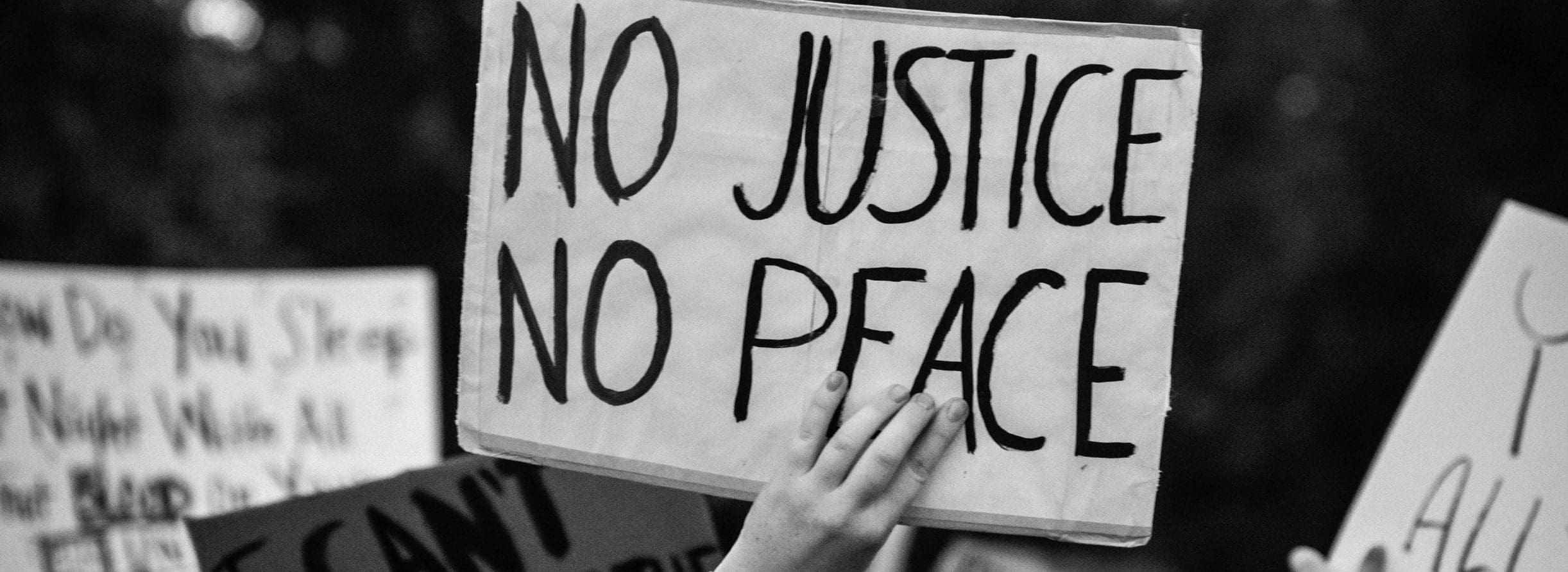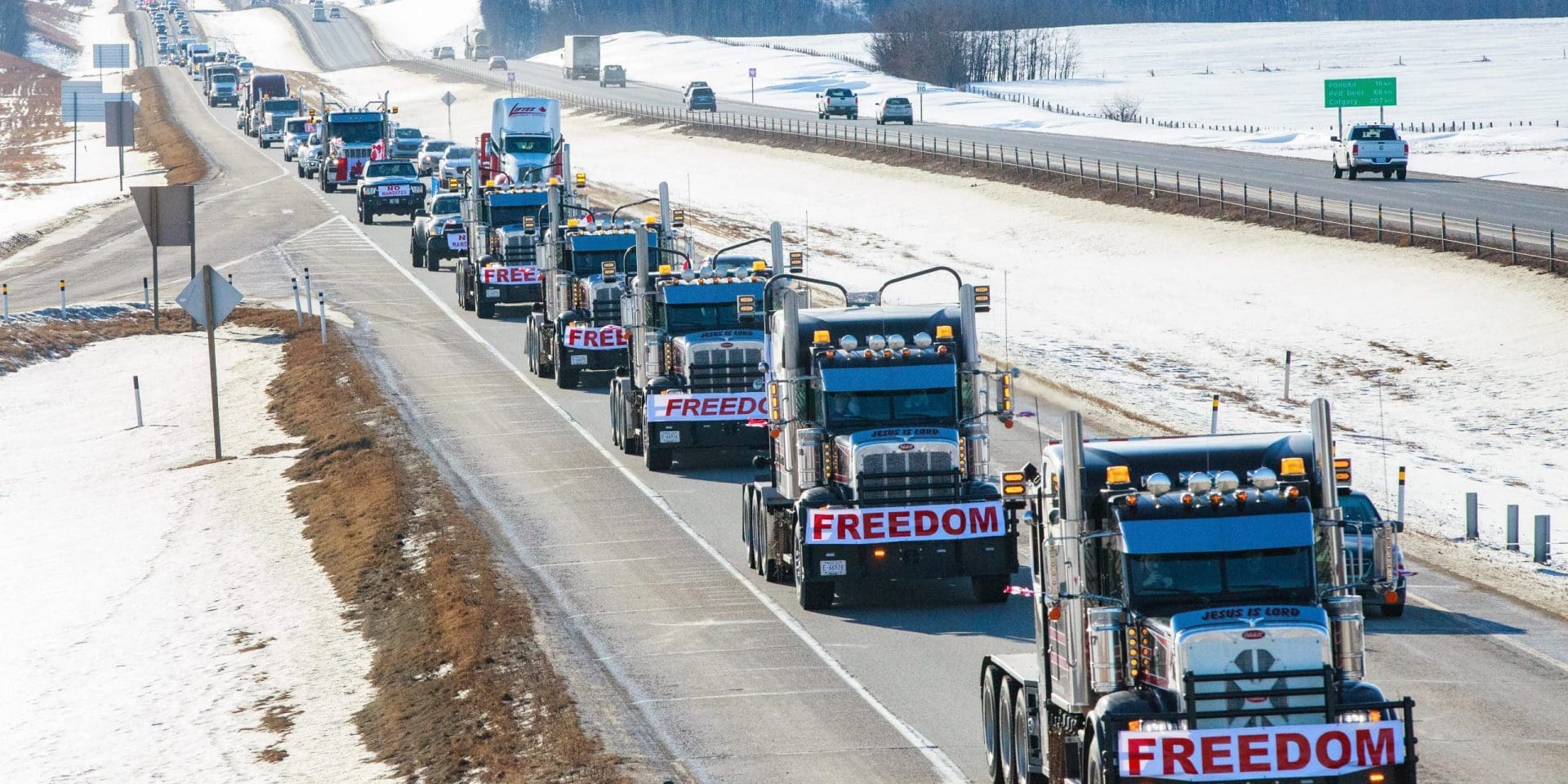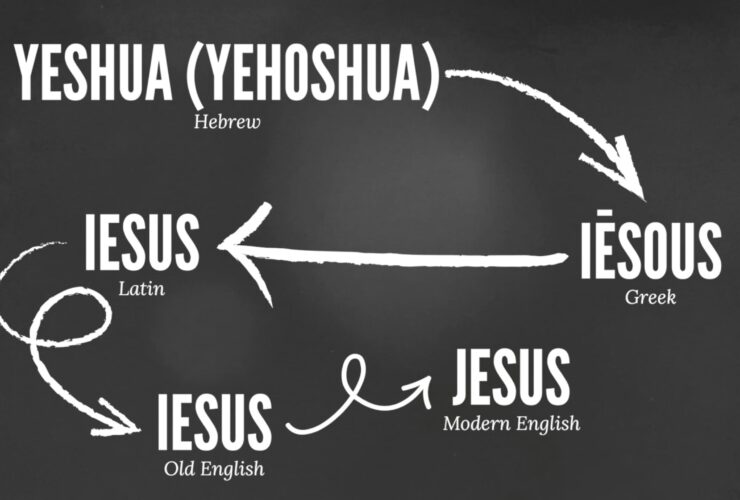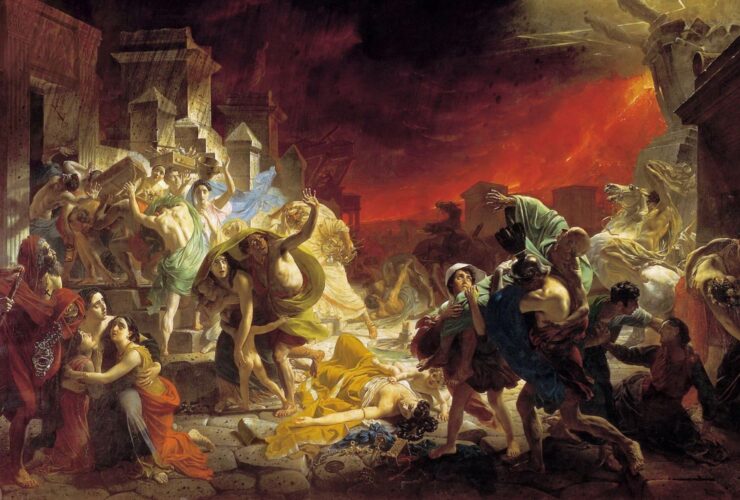Freedom cannot be measured. Equality cannot be weighed. Justice cannot be found wanting. Such priceless virtues of a Christian conscience are, indeed, pillars of democracy, political expressions shadowing a spiritual reality, a reflection of God’s impartiality toward all people (Matthew 5:43-48). While I maintain the necessity of these virtues for a sustainable democratic structure, as of late Evangelicalism has all but hijacked these virtues for half-truth activism and politicized oorah, forgoing the spiritual substance that gives it solid ground. For individual rights and freedoms do they take up their signs like a cross (cf. Matthew 16:24-26). The list is long: Mask mandates inhibit my quality of life; vaccine mandates oppose my freedom of conscience; vaccine passports polarize society and promote systemic injustice and societal inequality; lockdowns are unconstitutional and have caused a spike in mental health, drug abuse, and suicide cases; Bill C-4 abolishes the Charter of Rights & Freedoms, in particular, the freedom of expression, conscience and religion–––and to that, it most certainly does. There is merit in defending freedom against corruption. There is nothing inherently wrong with using civil rights at our disposal. Paul, after all, consistently used his Roman citizenship as an opportunity: “I appeal to Caesar.” (Acts 25:9-12) Likewise, protesting injustice and standing for liberty and the least advantaged in a democratic world, such as our own, is not necessarily rabblerousing; if conducted peacefully, respectfully, and in proper order of priorities, it’s a right we share as citizens of the free world. But that is not what perturbs me so deeply; in fact, in a secular world, it’s to be expected. What makes Paul’s case different than ours is that he utilized his citizenship as an opportunity to spread the gospel at the expense of his own life, whereas we utilize our citizenship to fight for personal opportunism and privileges for this life in the name of Christ. We’ve got it backwards.
Freedom is no longer sought in Christ but in legislative rights. And yet, were not Paul and Silas spiritually liberated in Christ while unlawfully beaten and imprisoned? And when given the opportunity for escape, whose life did they put first: their own or the guard’s? (Acts 16:22-34) Equality is partial to political agreeability–––all will be well if only the nation were radically conservatized. And still, is not equality under the law predicated on equality in Christ, loving your neighbour (and enemies) as image-bearers of God? (Galatians 3:28; Mark 12:29-30; Luke 6:27-36; Genesis 1:27) Justice is excessively individualized such that it forsakes mercy. Yet is it not God’s mercy that triumphs over our deserved judgment? (James 2:13; Luke 6:36) Christian freedom is thought grounded in numbers and political fervour, and then sought after through short-sighted legalism as if the law is transformative, eclipsing mutual edification through the fruit of the Spirit, and yet against such there is no law (Galatians 5:22-23). But suppose the law justifies for a moment; if righteousness, justice, and the good life come through the law, whether Jewish or Gentile, Biblical or secular, Christ died in vain (Galatians 2:21).
“If my kingdom were of this world, my servants would have been fighting….But my kingdom is not from the world.”
John 18:36
Here’s the push: We are at war. By not acting in the face of evil, you are thereby condoning it. At the expense of Christian witness and the cost of discipleship, the gospel has morphed into a sociopolitical animal, and Christ is on their side. By resuscitating Christian virtues in legislation, it is presumed to recreate a Christian society and, by consequence, more Christians. If only it were that simple. We would do well to collectively remind ourselves of Christ’s words: “My kingdom is not of this world. If my kingdom were of this world, my servants would have been fighting, that I might not be delivered over to the Jews. But my kingdom is not from the world.” (John 18:36) Conformity to this Evangelical strand of identity politics reveals the broad swaying power of the welfare state, legacy media, nationalism, and the natural repercussions of government overreach. In shorter words, we watch the news more than we read our Bibles. Worse yet, we read the news in when we read between the lines. And then, we believe everything we read.
To top things off, each political push is hyper-spiritualized and sprinkled with charismania and misread biblical homages. Remember when Donald Trump was Cyrus the Great incarnate, liberating Christians from the bondage of left-leaning politics to save the American way (a synonym for the “Christian” way). Now the trucker’s ‘freedom convoy’, so I’ve heard, is likened to the Red Sea Crossing. Prohibited to cross the US/Canadian border without proof of double-vaccinations, an unscrupulous mandate by lord chancellor Trudeau, no doubt, the truckers are protesting across Canada, in Exodus fashion, to the Promised Land of Ottawa, Ontario, Canaanada; splitting the Niagara from the Falls to take back the land from those Philistinian scum on Parliament Hill, to revoke vaccine mandates, open boarders, and restore peace once more. I did not draw these parallels, by the way. They are, supposedly, “anointed” for the task, activating God’s will with every revved engine. As a white Western male of the first world, a Christian no less, I am the victim of appropriation on all fronts!
But that is not to undermine the validity of the trucker’s protest–––not for a moment. Freedom of expression, conscience and religion is under threat. Vaccine passports are now here, an infrastructure teeming with latent abuse. And what can be expected of the world is now infiltrating the Church. In the province of Quebec, vaccine passports are necessary for worship services, disqualifying the unvaxxed from worship and hearing the gospel, lest you be held culpable before a court of law. I hear rumblings of churches hosting two Sunday services, one for the vaccinated and another for the unvaccinated. I frequently overhear that antivaxxers should not be tolerated, taking cues from Trudeau who called those people “racist and misogynistic extremists”[1], even so far as to consider an “unvaxxed tax”, and that unmaskers are societal scum tearing down civilization. While such propaganda is plastered over the mainstream news, the line between church and state is blurring by the day. The loose, one-sided language of Bill C-4 proactively encourages discrimination against said freedoms and directly opposes the notion of sin let alone the argument for it, and it’s punishable by law: fine or imprisonment[2]. Worst of all, it seems like many churches are bending over backwards to ensure these government mandates are enforced, even so far as to look down upon other churches for not complying, without even understanding the context of where God has situated them (Acts 17:26-28). Whether it’s limp-wristed liberalism or stiff-necked conservatism, Evangelicalism is polarized, caught in the middle of a political whirlwind.

My contention, here, ought to be clear; all this animosity against Christian values is to be expected in a secular-run society that dismisses moral truth, evil, and sin and yet is ensnared by it. My principal contention is not with the world, it is with how we, as Christians – those appointed for adoption in God’s Kingdom – are currently viewing the solution to this oncoming threat against Christianity, if indeed you view it as a Christian threat rather than a personal threat. For many, as far as I can tell, the values and priorities are in the wrong order, whether by rank or conflation. It’s become about how these mandates affect me. And if Christians don’t get their act together, this so-called fight for freedom will be futile: politically and spiritually.
How did this happen? Or rather, how did we lose sight of what really matters? To put it bluntly; we have too long indulged in our justification at the expense of our sanctification. Claiming Christ on our own terms. We have lost sight of our first-order values, which gives us perspective on how we ought to prioritize our belief, thought, behaviour, and attitude. If we, as Christians and a nation, desire to reflect God’s will for humanity in, say, freedom of expression and conscience, it cannot be won in Senate, Parliament, or the Supreme Court, nor does it begin in the streets, homes, or cathedrals. What is it that Christ says? “The truth will set you free.” And not unlike us today, the Pharisees’ immediate reaction was to politicize Christ’s intent as well, “We are offspring of Abraham and have never been enslaved to anyone”. Christ, then, outlines the foundational problem with humanity and its solution, “Truly, truly, I say to you, everyone who practices sin is a slave to sin. The slave does not remain in the house forever; the son remains forever. So if the Son sets you free, you will be free indeed.” (v.34-36, John 8:31-46) For what does Paul say in turn, “for all of sinned and fall short of the glory of God” (Romans 3:23).
Governmental laws, rights, and freedoms are a mere bandage for the human condition: sin, evil, suffering, corruption, you name it. It’s helpful, but not soluble. The bandage doesn’t heal you. As Christians, we are called to be part of the solution, to live like and share Christ with the lost and spiritually sick–––that includes the radical Left and fanatical Right, whom Christ was crucified for. We’re called to something higher. If politics hosted the solution, why did Christ come? If law could actually solve the problem of evil and sin, Christ came for nothing, and your faith is in vain. Democracy works because Christianity works, not the other way around. What does that mean for freedom?
Freedom is Won Through Forgiveness
Freedom is won through forgiveness. In fact, freedom fails without it. As Christians, we are forgiven of all sin, and if we don’t forgive those who wrong us, our Heavenly Father won’t forgive us (Matthew 6:14-15). And if you are not forgiven, well, you know the drill. Therefore, forgiveness is equal to life, it is the proverbial breath of our soul–––we live to forgive, and through such, we have eternal life. The Christian expectation of forgiveness is not to ‘forgive and forget,’ nor is it like a light switch you can flick on and off. It is not a passive, idle, pliable forgiveness that does nothing in the face of evil, injustice, or sin. Rather, to forgive like Christ is to live in active, perpetual, persevering forgiveness. That is, we live through forgiveness. For what does Christ say, “If anyone would come after me, let him deny himself and take up his cross and follow me. For whoever would save his life will lose it, but whoever loses his life for my sake will find it. For what will it profit a man if he gains the whole world and forfeits his soul?” (Matthew 16:24-26) Again, what does Christ say to the lost gone astray, to the disciples who betrayed him, to Israel who forsake him, to the unjust trial of Pontius Pilate, to the guards who beat and nailed him on the cross, to the neighbours we love and the enemies who hate us: “Father, forgive them, for they know not what they do.” (Luke 23:34) This is the ground by which we walk.
Consider; what good is there in free speech if it is only used for political powerplays, propaganda, lies, deceit, selfish ambition, or to tear each other down? Free speech is optimized for mutual edification and seeking the truth: God. Otherwise, it’s useless. Let’s also look at this practically. If the current set of politicians at large are trampling over the Charter of Rights & Freedoms as is plainly written for their own political advantage, do you really think changing legislation will change their hearts or the culture we’re in? Who is to say what law passed for freedom today will not be overturned ten years from now in the name of human rights? It may buy time, sure, but the moral condition and spiritual state of our society will still be in utter ruin, especially if most citizens despise Christian ethics. Politics is a pendulum. It needs an anchor. It needs Christianity.
There is a religious shift happening all around us, disguising itself as culture and identity politics, and it directly undermines the Christian foundation of morality that has built a strong democratic constitution in the West, and it is doing so through religious vectors: identity, value, purpose, meaning, and morality. Not that it embodies or cares for the true essence of what these vectors mean to human wellbeing, rather it sets out to socially redefine these vectors for political power and societal advantage, having declared moral truth fraudulent. Governmental law is not moral law; it is a low-resolution expression of it. So, that does not mean we abandon our moral values, witness, discipleship, the fruit of the Spirit and the gospel to fight “fire with fire”, lest we become the fire and burn the whole thing down, and us with it. Let’s not be played, here. Political ambition is the new religion of this age. And what does Paul say, “Do not be overcome by evil, but overcome evil with good.” (Romans 12:21).
Without forgiveness, freedom mutates into a cold-hearted compliance of merciless social approval, trapped by popular opinion and political preference–––sound familiar? Our political problems cannot solve the human problem. Forgiveness is necessary for freedom to work. And yet, forgiveness is lame without humility, and humility is deceived without sanctification, and what is sanctification if not the love of God? This same love is what allows you to love neighbour as yourself–––not called to love less or more than yourself, in false humility or self-deprecation, but as image-bearers must we love all humans equally, and this includes yourself necessarily. Tell me; how is it humanly possible to do good to those who hate us, to bless those who curse us, to pray for those who abuse us? What political advantage is there? If we only love those who love us and do good to those who do good to us, what makes us different from the world? Would we, too, not be indulgent in our sins if not for Christ? Therefore, without the self-sacrificial power of Christ, there is no freedom. Just selfish ambition. Let us be merciful, just as our Father is merciful (Luke 6:27-36). The fight is for their souls, not to win their hearts.
Christ’s kingdom may not be from this world, but it is for this world. Fight the good fight, win the war, and freedom will abound.

Matlock Bobechko is the Chief Operating/Creative Officer of Bible Discovery. He is an eclectic Christian thinker and writer, award-winning screenwriter and short filmmaker. He writes a blog on theology, apologetics, and philosophy called Meet Me at the Oak. He is also an Elder at his local church.
[1] Dave Naylor, Trudeau calls the unvaccinated racist and misogynistic extremists: But he said the people of Quebec are not the problem and questioned whether the rest of Canada needs to “tolerate” the unvaccinated. Western Standard. Published on December 29, 2021.
[2] Statutes Of Canada 2021, Chapter 24. An Act to amend the Criminal Code (conversion therapy). Assented To December 8, 2021. Bill C-4.
https://www.parl.ca/DocumentViewer/en/44-1/bill/C-4/royal-assent






